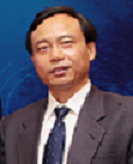
Chang Yun Wang
Ocean University of China, China
Title: Marine bioactive natural products from coral-derived fungi collected from the South China Sea
Biography
Biography: Chang Yun Wang
Abstract
Symbiotic microorganisms in corals have proven to be a rich source of structurally novel and biologically active secondary metabolites that have become interesting and significant resources for drug discovery. In recent years, during our ongoing study on bioactive natural products from the South China Sea, diverse bioactive secondary metabolites with variety structures have been isolated from coral-derived fungi, such as alkaloids, macrolides, anthraquinones, and peptides. For instance, a pair of new enantiomeric alkaloid dimers, (+)- and (−)-pestaloxazine A, with unprecedented symmetric spiro-[oxazinane-piperazinedione] skeleton, consisting of 22 carbons and 12 heteroatoms, were isolated from a Pestalotiopsis sp. fungus derived from the soft coral Sarcophyton sp.. A series of prenylated indole alkaloids were isolated from Aspergillus sp. fungus derived from the gorgonian coral Dichotella gemmacea. Quinazoline alkaloids with heptacyclic skeleton formed via a bridging hemiaminal linkage was isolated from Scopulariopsis sp. fungus derived from gorgonian Carijoa sp. Prenylated dihydroquinolone derivatives were obtained from the fungus Aspergillus sp. cultured from gorgonian Muricella abnormalis. And a series of 14-membered resorcylic acid lactones (RALs) belonging to a family of benzannulated macrolides were obtained from a gorgonian-derived fungal strain Cochliobolus lunatus. The compounds exhibited diverse promising bioactivities, including antifouling activity against barnacle B. amphitrite, antibacterial activity towards pathogenic bacteria, cytotoxicity against human tumour cell lines, and antiviral activity against human respiratory syncytial virus (RSV) and enterovirus 71 (EV71). It could be concluded that the bioactive secondary metabolites produced by coral-derived symbiotic microorganisms should be a rich source for discovery of marine lead compounds.

